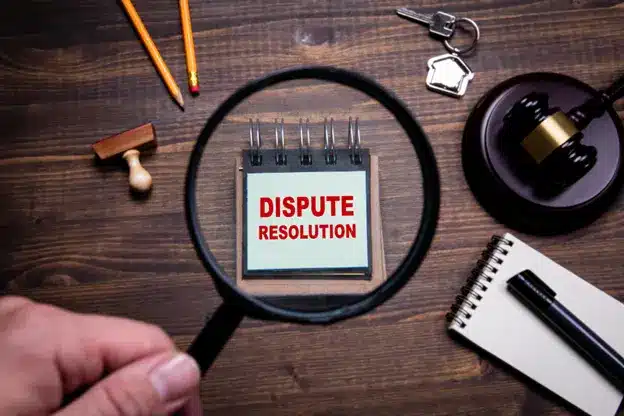
Often, people come to us gung-ho about suing someone to make them pay for some wrong they have had to endure at the hands of the other party. Perhaps a business partnership went sour. Or they feel slighted in a will.
This desire to jump straight to litigation is understandable from an emotional standpoint. However, here’s the truth: even if you ultimately win, you will be the one who is paying.
How so? Because litigation is slow, time-consuming, and expensive for both sides. In this post, we’re going to dive more deeply into what that means, and then offer up some possible alternatives to traditional litigation.
[READ TRANSCRIPT]
Hi, welcome back to another dose of Bite-Sized Bits of Knowledge, where we’re giving meaningful information in a short amount of time. Today, we’re just expanding on litigation.
We just talked about the whole process from start to finish and how it works and some of the tools and timelines. In this video, I want to talk about what is the consequence of litigation.
And what I mean by that is that we’ve talked about all these different things that have to happen in the process, and that there’s a time frame for each of them. And those time frames are typically 30 days. Defendants have 20 days to respond to the complaint, but pretty much all the different things are 30 days. All the discovery tools we talked about are 30 days to respond.
But in reality, counsel is going to give extensions as a courtesy, because you’re going to want the same courtesy when you need it. And even if you didn’t give them the courtesy of an extension, a party can just file a motion for extension of time. And until that gets heard at a hearing, there’s an extension of time. And usually that hearing is not going to be immediate, almost like that motion is buying you some time. Then there’s a hearing and the court is going to probably say, “Okay, you have 10 days or 20 days to respond,” giving even more extension of time.
So 30 days becomes 60 days in many instances. Obviously, you can abuse that. But as you can see, one thing that 30 days can turn into 60 days. And if that happens periodically over the course of a case, it’s going to add up significantly when both parties are doing it. And especially if there’s multiple parties. I mean, if you have five parties involved, my goodness.
So the end all be all here that I want to communicate to you about litigation is that it’s a process. It’s a long process. And because there’s so much that goes into it, there’s so much time that goes into it, it’s expensive. Billable hours in the community obviously vary by location, but it’s not uncommon to have a $500 an hour lawyer with associates and paralegals beneath him or her with lower rates, all collectively working on a case – or more than one lawyer working on a case.
I mean, it’s not uncommon. There’s a lot of work to do. There’s research, there’s drafting, there’s preparation, there’s attending hearings and depositions. And of course, there’s trial, which could be several days. And so each one of these things can add up.
I mean, if you have three people working on it and collectively they’re $800 an hour, you’re looking at probably hundreds of hours. Hundreds of hours. And I’m not inflating that number. Okay? It takes time. If you’re a good attorney, it takes time to be prepared and do a good job and be thorough.
Now, some clients say, “Wait a second, you do this every day. You should know all the answers to all these questions.” And that’s just not realistic. That’s not realistic. No attorney knows all the answers. It’s very fact specific. It depends on what your goals are, what the facts and circumstances are, and what strategies are being taken by other sides.
And so there’s statutes, there’s case law, and you got to find the right things that support your position and rebut the other party’s position. And again, that’s research, that’s time, that’s money. Okay? So we’re talking deadlines that get extended, and we’re talking research, we’re talking preparation for hearings, drafting the discovery documents, the responses to the discovery documents, preparing for deposition, attending deposition, reviewing the deposition transcripts, which can be hundreds of pages. This stuff adds up quick.
And so people come sometimes, and they want to sue somebody. They’re upset, it’s emotional, and they bang on their chest. “I want to take them for everything they got. I want to make their life miserable.” And they probably can do that for a little while. But it’s like a double edged sword, because what happens is that after a few months of getting $10,000 or $20,000 bills from a law firm, you start to come back to reality of maybe this isn’t the best course of action.
In some cases, you just got to do it. But in other cases, there’s always a middle ground. Just move on and spare your wallet and your emotional wellbeing, mental wellbeing, and your life. Because it’s disruptive to your life. To be told you have to be in a deposition on a certain day and you have to cancel work and you got to cancel plans with people because you got to start looking for documents.
I think people underestimate how much of a disruptive process this is beyond financial. It really is. I see it before my own eyes with clients and friends. So I would love to encourage you to understand the realities of litigation, and it will take time and it will cost money.
And if there’s a better way to resolve it, I would encourage you to do so in one of two ways. One, avoid it by working with a planning firm like ours. And two, maybe looking at alternative dispute resolution options like we’ve talked about in our other videos. So I hope you found this to be helpful. And stay tuned. Thanks for stopping by and stay tuned for more.
What Are Some Alternatives to Traditional Litigation?
If you watched the above video or read the transcript, you’ll know that I already mentioned two: engage in careful legal planning and utilize alternative dispute resolution. Let’s look at each of these a bit.
Legal Planning to Avoid Litigation. In the realm of business, a knowledgeable attorney can help you with business formation, succession planning, contract creation and disputes, and more. Likewise, a well-constructed estate plan can minimize the likelihood of people suing over not being included as beneficiaries – or simply not happy with what they get – as well as dealing with different types of tax issues, planning for special needs, and clarifying your desires in the event of incapacity.
Alternative Dispute Resolution. Quite literally, the point of ADR is to avoid litigation. It is where you enlist the help of a neutral third party to help you and someone else who are in disagreement to come to a mutually beneficial resolution. Often, this is some form of mediation where the parties involved discuss the issue, detail their complaints, and each side gives a bit to resolve the problem. Other types of ADR include negotiation, conciliation, and arbitration, and frequently several of these will be used in conjunction to reach resolution. One of the smartest things a business can do is to codify an ADR process that all parties agree to follow during the planning stage mentioned above. This creates a legally binding set of rules that parties in a dispute must follow before escalating to litigation.

Bottom line? If you value your time and money, avoid litigation at every possible opportunity. While in certain situations it is a necessary evil, in most cases it merely serves to drain precious resources and prevent you from focusing on other, more important things.
Want to learn more about what you can do to avoid litigation? Don’t hesitate to reach out to Haimo Law for advice.